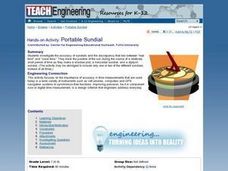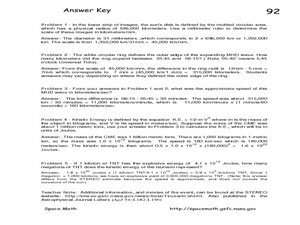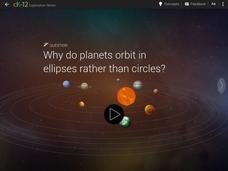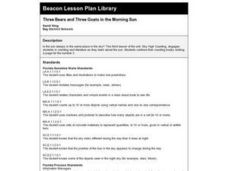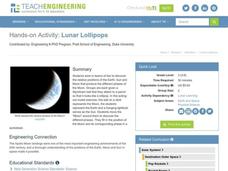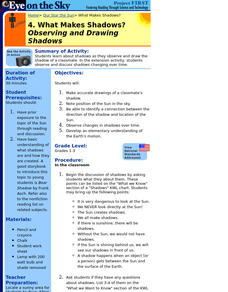Curated OER
There Was Always Sun
Students investigate the chronicles of history about the Negro Leagues baseball by using rare historical footage and interviews with Black baseball greats. Students also examine how to work in groups to use online resources to reinforce...
Curated OER
Portable Sundial
Students work together to identify the accuracy of sundials. They track the position of the sun and create a shadow plot. They discover the difference between real time and clock time.
Curated OER
Individual Horizontal Sundial 2: Cloud/Rain Activity
Young scholars create a sundial to measure local apparent time as it relates to the position of the sun in the sky. In this sundial lesson, students cut and glue gnomon to a sheet of thin cardboard. Young scholars then set the...
Curated OER
STEREO Watches the Sun Kick up a Storm!
In this solar storm worksheet, students use images of a solar tsunami to determine the size and speed of the wave. This worksheet has 5 problems to solve.
Curated OER
The Solar System and Beyond
What an inspiring PowerPoint! The color scheme and pictures all contribute to the scientific style of this PowerPoint and will keep the attention of your junior high kids. The diagrams help illustrate the positioning of the moon, sun and...
Scholastic
Study Jams! Seasons
Use this during the season of teaching about the seasons! As Earth revolves around the sun, its tilt causes the weather to change. The graphics in this presentation show how Earth's position in space has an effect on the angle of...
CK-12 Foundation
Pythagorean Theorem to Determine Distance: Tree Shadows
Why is that shadow getting longer? Determine the changes in the length of a shadow as the sun changes position in the sky. Individuals use an interactive to calculate the length of a shadow at different times during the day via the...
CK-12 Foundation
Orbital Motion
Why do planets orbit the sun in ellipses when moons orbit their planet in circles? Pupils control the semi-major axis, eccentricity of the orbit, and position angle. The resulting orbital appears with the related force vectors as...
Curated OER
Shadows and Skyscrapers
Eighth graders explain the relationship between the position of the sun, a city's latitude and shadow length. Ratio's, geometry, and algebra are used to determine the shadow lengths and building heights. A sun angle (altitude) charts to...
Curated OER
Albedo and Irradiation of Surfaces
Here is a physical science activity where pupils place thermometers inside of a white and a black paper pocket and place them under a lamp. They record and compare the temperature increase over a ten-minute period. Have your class...
Curated OER
Sundials
Students investigate the different types of sundials and their history. In this shadows and time of day lesson students build their own sundials.
Curated OER
Seasons and Shadows: Investigate How Shadows Shift Throughout the Year
Learners examine their shadows and why they are different in the summer and winter. In this seasons lesson students complete an activity to see how the earth's tilt on its axis changes the length of shadows.
Curated OER
The Night Sky
Third graders develop questions they have about the solar system. After being read a book, they view and discuss different constellations in the sky. In groups, they are given a piece of butcher paper and glow in the dark crayons in...
Curated OER
The Analemma
Students describe the relationship between the tilt of Earth's axis and its yearly orbit around the sun, by learning about analemmas. They determine what they can do to show that the sun's position doesn't change, and they find ways to...
Curated OER
Knowing North: Understanding the Relationship Between Time and The Sun
Students determine how to find North using a watch and their shadow. For this finding North lesson, students go outside on a sunny day and work with their shadow and a wrist watch to find out which direction that North is. They examine...
Curated OER
Three Bears and Three Goats in the Morning Sun
First graders listen to the story Three Bears from the book, Three Tales of Three, focusing on the one-to-one correspondence while counting various items in the story. They create pages for the number 3 for their counting books.
Curated OER
Lesson 1 Activity 1: Tools of the Ancients
Students examine how Christopher Columbus determined his latitude.
Columbus City Schools
Moon Phase Mania
Now you see it, now you don't. Our moon seems to pull a disappearing act from time to time—but why? Take your seventh grade scientists above and beyond to discover the truth about the moon and the role it plays in Earth's little...
Space Awareness
Britannia Rule the Waves
Could you determine longitude based on measuring time? Early explorers used a longitude clock to do just that. Scholars learn about early exploration and the importance of the invention of the clock. Then pupils build their own longitude...
Curated OER
Photo Synthesis and Transpiration
Young scholars germinate pea seeds and plant the seeds. They experiment with different amounts of light and darkness on the plant growth.
Curated OER
A New Slant On The Seasons
Students identify how the tilt and position of the Earth causes the seasons. After a discussion of the seasons and when they begin. Using themselves as the objects in the universe, they role play how the rotational movement of the...
Curated OER
Lunar Lollipops
Students work with a partner, Styrofoam ball and light source to simulate the positions of the Earth, Moon and Sun at various stages during the phases of the Moon. They describe why the Moon is visible from Earth and complete a worksheet.
Curated OER
What Makes Shadows? Observing and Drawing Shadows
Students make accurate drawings of a classmate's shadow. They note position of the sun in the sky. They identify a connection between the direction of the shadow and the location of the sun. They observe changes in shadows over time.
Curated OER
Dark Side of the Moon
Students discover the position of the Earth, Moon, and Sun during each of the phases of the Moon. They then draw a diagram to show the position of the Moon, Earth, and Sun in each of the phases of the moon.

